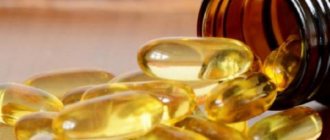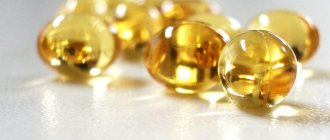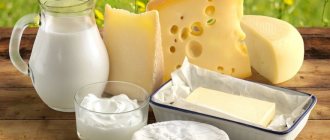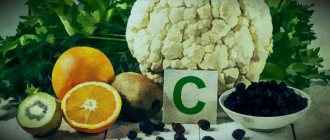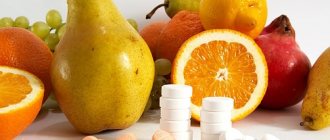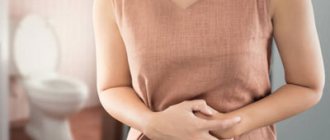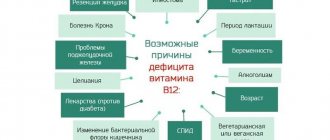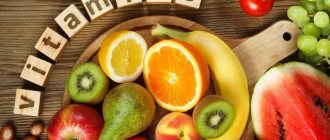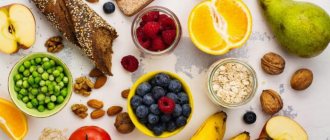If you have enough vitamin P in your body, your capillary vessels will be strong and healthy. It is a powerful antioxidant that not only acts like vitamin C, but also enhances its properties.
- What is vitamin P?
- What foods contain vitamin P?
- Why do our bodies need polyphenols?
- Vitamin P deficiency
- Daily intake of vitamin P
By the way, the letter P appeared in its name not by chance, but was taken from the English word “permeability”, which translated into Russian means “permeability”. This substance reduces capillary permeability.
Although, in fairness, I will still write that vitamin P is a whole community of substances with similar properties. To be more precise, there are approximately 5,000 compounds that are grouped under the umbrella term “flavonoids,” “bioflavonoids,” or “polyphenols.” They, in turn, are also divided into groups of rutins, hesperedins, citrines, catechins and others.
So, if you confuse vitamin P with bioflavonoids, there will be no mistake. It is the same! It has been proven that the antioxidant properties of these substances are approximately 50 times stronger than those of vitamin E and 20 times more powerful than those of vitamin C.
Back to contents
What is vitamin P?
Albert Szent-Gyorgyi
Vitamin P is often also called rutin, however, from the point of view of strict scientific knowledge, this is incorrect.
But in medical practice this name most often appears, and therefore I will allow myself to sometimes use this generally accepted term in the article.
Since I’m talking about scientists, I’ll mention that in the 30s of the last century, biochemist Albert Szent-Gyorgyi discovered a substance that worked well in the treatment of scurvy.
It strengthened the walls of capillaries and increased the effectiveness of ascorbic acid, which is vital for this disease.
The researcher called it vitamin P. Since then, every substance with similar properties has been called that way, and the ability to increase the strength of vascular walls itself has been called P-vitamin activity.
20 years later, the Englishman T. Geissman proposed adding another term “bioflavonoids” to this group of compounds. They were named so due to the commonality in the structure of the molecular lattice - all of these substances had aromatic benzene rings.
In fact, polyphenols are found everywhere in nature. You've probably thought at least once about why fruits are multi-colored... It turns out that they owe their brightness and diversity precisely to these substances, which act as color catalysts in them.
It is also noteworthy that bioflavonoids are found only in plant foods, so vegetarians and raw foodists probably have no problems getting these vital substances from food.
Back to contents
LiveInternetLiveInternet
Vitamin P, which foods contain vitamin P, the role and importance of vitamin P, deficiency and excess of vitamin P Vitamin P - (rutin, citrine, catechins, hesperidin, etc.) is a complex of compounds called bioflavonoids. These water-soluble plant substances are very important for our health. Most often, when people talk about vitamin P, they mean citrine and rutin. We will talk about bioflavonoids in general; they are also called bioflavins, flavonoids, etc. All bioflavonoids act in a similar way - they reduce the fragility and fragility of capillaries. Doctors say that they reduce their permeability; that is why they began to be called vitamin P. Bioflavonoids are generally an amazing natural phenomenon. Being in plants, they protect them not only from pathogenic bacteria, fungi and parasites, but also repel pests and attract beneficial insects. It is bioflavonoids, located under the skin of fruits, vegetables and berries, that give them a wonderful bright color and a delightful aroma, leaving no one indifferent - neither animals, nor birds, nor people. When flavonoids enter the human body, they continue their work - they protect cells. All traditional medicine is based on these properties. Flavonoid molecules are infinitely diverse. Their effect on our body dramatically increases the effectiveness of other beneficial substances: for example, vitamin C in the presence of flavonoids becomes almost 20 times more active and itself receives protection from oxidation. What foods contain vitamin P, sources of vitamin P Sources of vitamin P are mainly citrus fruits - it is found in their white peel and interlobular part. There is also a lot of rutin in berries and fruits such as blueberries, raspberries, blackberries, black currants, rose hips, cherries, chokeberries, apricots, grapes. Among vegetables, its main sources can be considered cabbage, tomatoes, parsley, dill, cilantro, green salad, and capsicum. Buckwheat contains a lot of vitamin P, so it is recommended to eat it for varicose veins in order to strengthen the walls of blood vessels. Juice extracts and some drinks also contain vitamin P - tea, coffee, wine, live beer. Vitamin P is practically not preserved in frozen fruits. The role and importance of vitamin P Bioflavonoids protect and strengthen our entire body. They are distinguished by high antioxidant activity. For example, catechins contained in green tea can restore damaged cell structure. Bioflavonoids intercept and neutralize free radicals, increase immunity, protect us from the effects of negative factors, prevent the development of diseases and early aging. Vitamin P normalizes the structure of capillaries and maintains it in optimal condition; the capillaries remain elastic, can expand when necessary, and diseases do not occur. Bioflavonoids prevent the development of varicose veins, pressure changes, swelling and circulatory disorders. Together with vitamin C, they prevent the destruction of a very important substance - hyaluronic acid. This acid serves as a kind of “cement” for the cells of blood vessels and capillaries - it strengthens the cells and binds them to each other. It is hyaluronic acid that helps maintain the structure and strength of capillaries, reduces the permeability of their walls and the likelihood of bruising. Thanks to bioflavonoids, the cardiovascular system is protected from excess cholesterol. The effect of vitamin C on the immune system, its protection against infections and colds, becomes more effective in the presence of a sufficient amount of bioflavonoids, which have a pronounced antibacterial effect. Bioflavonoids delay the development of oncology, relieve and prevent inflammation, promoting the synthesis of glucocorticoids - substances that enhance the body's resistance to many diseases. By providing an anti-edematous and analgesic effect, vitamin P alleviates the course of bronchial asthma and other allergic conditions. It is bioflavonoids that are able to strengthen the thinnest walls of the smallest capillaries, repeating in our body the work that they have always performed in plants - since plant life appeared on Earth. With the help of these biologically active substances, you can quickly and without complications cure or significantly alleviate many diseases: intrauterine and other bleeding, hemorrhoids, hypertension, anemia, allergies, reduce the fat content in the blood; prevent the development of strokes and heart attacks. All bioflavonoids do not contain nitrogen, have a similar chemical structure and are essential in our immune system. They simply prevent infection and the occurrence of diseases, fight viruses and bacteria, bind and remove toxins and heavy metals from our body. Daily requirement for vitamin P How much vitamin P a person needs daily has not yet been established by scientists, but we can say that we always get enough bioflavonoids if our diet contains fruits, berries, vegetables and herbs. Of course, sometimes an additional intake of vitamin P is required - for example, if bruises quickly appear on the body with a slight injury or even simple pressure, then it is necessary to take bioflavonoids - along with vitamin C. Most doctors and nutritionists recommend consuming 25 to 50 mg of rutin. Another recommendation is 100 mg of bioflavonoids for every 500 mg of ascorbic acid. Lack and excess of vitamin P What can a lack of vitamin P lead to? First of all, it affects the capillaries, and this can result in serious diseases that are dangerous to health and life. First, the gums may bleed, hemorrhages appear in the skin and mucous membranes; a person becomes weakened and lethargic, quickly gets tired under any stress; When walking, your legs hurt, when you work with your hands, your shoulders hurt. This condition can occur after winter, when there is a lack of the most essential vitamins, including vitamin C, without which rutin cannot work effectively. With a deficiency of flavonoids, cerebral edema and cerebral bleeding can begin, as with injuries, but the cause is brittle and fragile capillaries. Diseases of other vital organs - heart, lungs, etc., also begin with diseases of the capillaries. When flavonoids enter our body in sufficient quantities, such situations do not arise - they manage to strengthen the walls of the capillaries and help the formation of new tiny vessels, strong and durable. Vitamin P is prescribed to pregnant women who are prone to miscarriages; they also treat and prevent thrombosis. Nothing is known yet about an excess of vitamin P. It is non-toxic, and its excess is eliminated from the body without any consequences. Vitamin P is best combined with vitamin C - they are even similar in action, complement each other perfectly and solve many health problems. Experts say about such substances that when they work together, so-called functional synergy occurs - the effect is increased several times. Make it a rule not to eat meat, fish or eggs without fresh raw vegetables, herbs and fruits. Fresh fruits and salads will help neutralize the effects of toxic substances that surround us everywhere in the modern world, including those found in food. Try to follow this rule for at least a week, and you will feel a surge of energy, vigor and a desire to work. Bioflavonoids preserve adrenaline, which helps the body stay in shape longer, stay fresh and strong. How to preserve vitamin P as much as possible How to preserve bioflavonoids in foods and in the body? They are destroyed by tobacco smoke and dissolve in water; They die in light, open air, heat treatment and freezing. Therefore, it is worth giving up bad habits and trying to eat as many raw, unprocessed foods as possible that contain this miracle of nature - an amazing and powerful protection against many diseases. Gataulina Galina for women's magazine InFlora.ru
What foods contain vitamin P?
Vitamin P is most abundant in chokeberry.
Polyphenols are concentrated mainly in the fruits, leaves, flowers, roots and juice of plants. The richer and brighter the fruits and berries, the more routine they contain. Pay attention to citrus fruits or cherries.
So, products with vitamin P: these are oranges, lemons, tangerines, grapefruits, rose hips, black currants, red and chokeberries, grapes, raspberries, cherries, sweet cherries, apricots, plums, blueberries.
By the way, chokeberry is an absolute record holder for the presence of flavonoids. For 100 g of berries – 3000 mg!
For comparison: the well-known source of vitamin C, rose hips, contains approximately 1000 mg. Various types of cabbage, beets, tomatoes, buckwheat, and lettuce also contain bioflavonoids.
It is interesting that each type of listed plants has a unique combination of these biologically active substances. For example, blueberries contain anthocyanins, and beets contain betaine and betanin.
It is believed that vitamin P is a group of fairly stable substances that tolerate external factors well.
Back to contents
Sources
Bioflavonoids are elements that are found in abundance in various foods, primarily in citrus fruits. It is worth knowing that vitamin P is not preserved after freezing. In addition, it is destroyed by:
- open air;
- tobacco smoke;
- Sveta;
- water;
- prolonged heat treatment.
Where is vitamin P found? All products with it are divided into two categories:
- Plant sources:
- Vegetables - tomatoes, cabbage, green salad.
- Fruits - apricots and grapes.
- Berries - cherries, blueberries, currants, raspberries.
- Greens - dill, parsley, cilantro.
- Citrus fruits - grapefruit, orange, lemon.
- Drinks - wine, live beer, coffee and tea.
- Chocolate - mostly only black.
- Animal sources . When considering which products contain rutin, one cannot help but mention an interesting thing. There are no bioflavonoids in animal products at all. That is why people whose diet does not contain enough berries, fruits and vegetables are simply obliged to include special supplements in their diet.
Record holders for element content:
- chokeberry - 4 g;
- cherry - 2.5 g;
- honeysuckle - 1.2 g;
- rose hips - 1 g;
- sorrel - 0.5 g;
- orange and lemon - 0.5 g;
- grapes - 430 mg.
All products that contain rutin are best taken fresh and preferably without heat treatment. In this case, you can count on real benefits for the body.
Special attention should be paid to green tea, which contains a large amount of catechins. They are distinguished by a neutralizing effect, which is achieved by binding metabolic products that can damage cells of organs and tissues.
Why do our bodies need polyphenols?
Vitamin P makes the walls of your blood vessels strong.
I have already noted that vitamin P is the best friend of capillaries and blood vessels, as it makes their walls real armor. Thanks to this property, rutin improves the process of transporting vital substances to our tissues and organs, and, consequently, activates metabolism in them.
Benefit
Other useful functions of this complex of substances in our body:
- As an antioxidant, it neutralizes the harmful effects on the body of free radicals that enter it from low-quality food, smoke, and exhaust gases. For this reason, bioflavonoids are known for their restorative and anti-cancer properties. They prevent premature aging of the body and have a beneficial effect on the functioning of the heart.
- They stop inflammatory processes in the body, as they reduce the concentration of C-reactive protein in the plasma, which is an indicator of the presence of inflammation.
- Not only does it act similarly to vitamin C, but it also protects it from oxidation, thereby enhancing the valuable properties of ascorbic acid. Together they guard our body during colds and viral infections.
- Activates the production of interarticular fluid, without which various joint diseases develop, leading to immobilization.
- Takes part in fat and carbohydrate metabolism, activates the center of redox reactions occurring in cells. Thus, it helps normalize body weight.
- Prevents the development of hypoxia - improves cell respiration.
- It has anti-edematous properties, due to which it reduces the intensity of allergic reactions and is effective in the treatment of bronchial asthma.
- Protects our body from the harmful effects of carcinogens that enter it with food.
- Activates collagen production and prevents the destruction of hyaluronic acid, which has a beneficial effect on the condition of our skin.
- Calms and relieves pain – regulates the production of adrenaline and norepinephrine, thereby controlling stress levels.
- It has a beneficial effect on the liver and stomach, promoting normal bile production. By the way, flavonoids are almost always included in therapy for ulcers.
- It is an excellent prevention of cataracts due to its property of strengthening capillaries, including the eye ones. Thus, bioflavonoids normalize eye pressure.
I warn you that polyphenols are not produced by the human body, so it is very important to track how much of them you get per day. If the body does not have enough vitamin P, then serious problems can occur in it.
Moreover, it also happens that this complex of nutrients is simply not absorbed by the body due to a number of pathologies:
- due to digestive problems, in particular inflammation of the gastrointestinal tract;
- due to long-term adherence to mono-diets on foods that are low in bioflavonoids;
- due to a diet in which there are oil sources of vitamin P or they are completely absent;
- due to bad habits that complicate the absorption of nutrients by the intestinal walls.
Back to contents
The role and importance of vitamin P
Bioflavonoids protect and strengthen our entire body. They are distinguished by high antioxidant activity. For example, catechins contained in green tea can restore damaged cell structure.
Bioflavonoids intercept and neutralize free radicals, increase immunity, protect us from the effects of negative factors, prevent the development of diseases and early aging.
Vitamin P normalizes the structure of capillaries and maintains it in optimal condition; the capillaries remain elastic, can expand when necessary, and diseases do not occur. Bioflavonoids prevent the development of varicose veins, pressure changes, swelling and circulatory disorders.
Together with vitamin C, they prevent the destruction of a very important substance - hyaluronic acid. This acid serves as a kind of “cement” for the cells of blood vessels and capillaries - it strengthens the cells and binds them to each other. It is hyaluronic acid that helps maintain the structure and strength of capillaries, reduces the permeability of their walls and the likelihood of bruising. Thanks to bioflavonoids, the cardiovascular system is protected from excess cholesterol.
The effect of vitamin C on the immune system, its protection against infections and colds, becomes more effective in the presence of a sufficient amount of bioflavonoids, which have a pronounced antibacterial effect.
Bioflavonoids delay the development of oncology, relieve and prevent inflammation, promoting the synthesis of glucocorticoids - substances that enhance the body's resistance to many diseases. By providing an anti-edematous and analgesic effect, vitamin P alleviates the course of bronchial asthma and other allergic conditions.
It is bioflavonoids that are able to strengthen the thinnest walls of the smallest capillaries, repeating in our body the work that they have always performed in plants - since plant life appeared on Earth. With the help of these biologically active substances, you can quickly and without complications cure or significantly alleviate many diseases: intrauterine and other bleeding, hemorrhoids, hypertension, anemia, allergies, reduce the fat content in the blood; prevent the development of strokes and heart attacks.
All bioflavonoids do not contain nitrogen, have a similar chemical structure and are essential in our immune system. They simply prevent infection and the occurrence of diseases, fight viruses and bacteria, bind and remove toxins and heavy metals from our body.
Vitamin P deficiency
Are your gums bleeding and teeth “flying”? You may be lacking vitamin P.
If you quickly get tired and experience pain in your legs and shoulders while walking, notice the appearance of bruises on the skin when pressed and small hemorrhages under the skin, and find bleeding gums, then know: these signs are very similar to vitamin P deficiency. It’s up to the tests!
Further more:
Persistent vitamin deficiency is characterized by loss of hair, teeth, and profuse acne. A bluish tint to the skin may appear and nosebleeds may become regular.
Just please, don’t panic and self-prescribe medications with this vitamin, especially from a pharmacy - its deficiency is rare. Indeed, if you don’t eat fresh fruits and berries at all, then this can happen to you.
The lack of flavonoids is easily restored by correcting the diet, especially since we do not need so much of it.
Back to contents
Vitamin P deficiency and excess
What can a lack of vitamin P lead to? First of all, it affects the capillaries, and this can result in serious diseases that are dangerous to health and life.
First, the gums may bleed, hemorrhages appear in the skin and mucous membranes; a person becomes weakened and lethargic, quickly gets tired under any stress; When walking, your legs hurt, when you work with your hands, your shoulders hurt. This condition can occur after winter, when there is a lack of the most essential vitamins, including vitamin C, without which rutin cannot work effectively.
With a deficiency of flavonoids, cerebral edema and cerebral bleeding can begin, as with injuries, but the cause is brittle and fragile capillaries. Diseases of other vital organs - heart, lungs, etc., also begin with diseases of the capillaries.
When flavonoids enter our body in sufficient quantities, such situations do not arise - they manage to strengthen the walls of the capillaries and help the formation of new tiny vessels, strong and durable.
Vitamin P is prescribed to pregnant women who are prone to miscarriages; they also treat and prevent thrombosis.
Nothing is known yet about an excess of vitamin P. It is non-toxic, and its excess is eliminated from the body without any consequences.
Vitamin P is best combined with vitamin C - they are even similar in action, complement each other perfectly and solve many health problems. Experts say about such substances that when they work together, so-called functional synergy occurs - the effect is increased several times.
Make it a rule not to eat meat, fish or eggs without fresh raw vegetables, herbs and fruits. Fresh fruits and salads will help neutralize the effects of toxic substances that surround us everywhere in the modern world, including those found in food.
Try to follow this rule for at least a week, and you will feel a surge of energy, vigor and a desire to work.
Bioflavonoids preserve adrenaline, which helps the body stay in shape longer, stay fresh and strong.
Daily intake of vitamin P
I note that it is better to take polyphenols accompanied by ascorbic acid. Moreover, the amount of vitamin C should be approximately 5 times higher than the amount of C-complex (vitamin P).
Adult men need 40-50 mg of bioflavonoids per day, women over 18 years old - 30-45 mg, children - on average 15 to 30 mg, depending on age.
Did you get a bruise after pressing on your skin? - Go for the chokeberry! =)
There is a very simple test to check if you have enough vitamin P in your body - just press firmly on your skin. If a bruise appears in that place, this is a clear sign that it is time for you to reconsider your relationship with this complex of nutrients, namely, increase their amount in the diet.
Did you do that? Please share your results!
Daily requirement of vitamin P
Scientists have not yet established how much vitamin P a person needs daily, but we can say that we always get enough bioflavonoids if our diet contains fruits, berries, vegetables and herbs.
Of course, sometimes an additional intake of vitamin P is required - for example, if bruises quickly appear on the body with a slight injury or even simple pressure, then it is necessary to take bioflavonoids - along with vitamin C.
Most doctors and nutritionists recommend consuming 25 to 50 mg of rutin. Another recommendation is 100 mg of bioflavonoids for every 500 mg of ascorbic acid.

